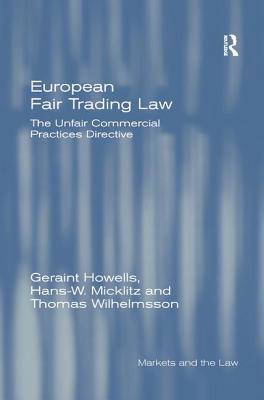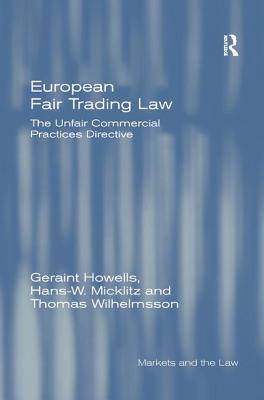
Door een staking bij bpost kan je online bestelling op dit moment iets langer onderweg zijn dan voorzien. Dringend iets nodig? Onze winkels ontvangen jou met open armen!
- Afhalen na 1 uur in een winkel met voorraad
- Gratis thuislevering in België vanaf € 30
- Ruim aanbod met 7 miljoen producten
Door een staking bij bpost kan je online bestelling op dit moment iets langer onderweg zijn dan voorzien. Dringend iets nodig? Onze winkels ontvangen jou met open armen!
- Afhalen na 1 uur in een winkel met voorraad
- Gratis thuislevering in België vanaf € 30
- Ruim aanbod met 7 miljoen producten
Zoeken
European Fair Trading Law
The Unfair Commercial Practices Directive
Geraint Howells, Hans-W Micklitz, Thomas Wilhelmsson
€ 44,95
+ 89 punten
Uitvoering
Omschrijving
The Unfair Commercial Practices Directive is the most important directive in the field of trade practices to have emerged from the EC but it builds upon European activity which has sought to regulate trade practices on both a sectoral and horizontal level. It is an umbrella provision, which uses general clauses to protect consumers. How effective this approach is and how it relates the existing acquis are fundamental issues for debate. This work provides a critical appraisal of the Unfair Commercial Practices Directive linking discussion of it to general debates about how fair trading should be regulated. It explains how the Directive fits into the existing acquis. It also examines national traditions where these are necessary to explain the European approach, as in the case of general clauses. The book will be a valuable tool for any student of consumer law seeking to understand the thinking behind the directive and how it will affect national laws. It will also influence policy makers by suggesting how the directive should be interpreted and what policy lies behind its formulation. Businesses and their advisers will use the book as a means of understanding the new regulatory climate post-the directive.
Specificaties
Betrokkenen
- Auteur(s):
- Uitgeverij:
Inhoud
- Aantal bladzijden:
- 312
- Taal:
- Engels
- Reeks:
Eigenschappen
- Productcode (EAN):
- 9781138266919
- Verschijningsdatum:
- 15/11/2016
- Uitvoering:
- Paperback
- Formaat:
- Trade paperback (VS)
- Afmetingen:
- 156 mm x 233 mm
- Gewicht:
- 452 g

Alleen bij Standaard Boekhandel
+ 89 punten op je klantenkaart van Standaard Boekhandel
Beoordelingen
We publiceren alleen reviews die voldoen aan de voorwaarden voor reviews. Bekijk onze voorwaarden voor reviews.











